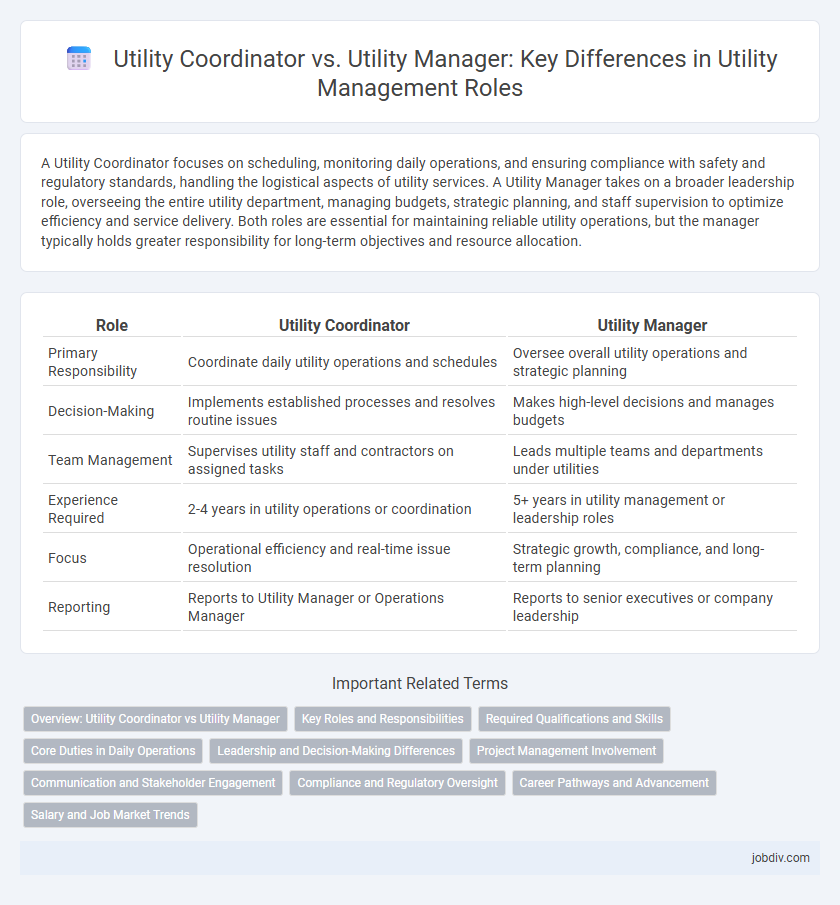A Utility Coordinator focuses on scheduling, monitoring daily operations, and ensuring compliance with safety and regulatory standards, handling the logistical aspects of utility services. A Utility Manager takes on a broader leadership role, overseeing the entire utility department, managing budgets, strategic planning, and staff supervision to optimize efficiency and service delivery. Both roles are essential for maintaining reliable utility operations, but the manager typically holds greater responsibility for long-term objectives and resource allocation.
Table of Comparison
| Role | Utility Coordinator | Utility Manager |
|---|---|---|
| Primary Responsibility | Coordinate daily utility operations and schedules | Oversee overall utility operations and strategic planning |
| Decision-Making | Implements established processes and resolves routine issues | Makes high-level decisions and manages budgets |
| Team Management | Supervises utility staff and contractors on assigned tasks | Leads multiple teams and departments under utilities |
| Experience Required | 2-4 years in utility operations or coordination | 5+ years in utility management or leadership roles |
| Focus | Operational efficiency and real-time issue resolution | Strategic growth, compliance, and long-term planning |
| Reporting | Reports to Utility Manager or Operations Manager | Reports to senior executives or company leadership |
Overview: Utility Coordinator vs Utility Manager
Utility Coordinators oversee daily operations, scheduling, and communication between teams to ensure efficient utility service delivery. Utility Managers focus on strategic planning, budgeting, and compliance with regulatory standards to optimize overall utility system performance. The Coordinator acts as a liaison for field operations, while the Manager drives long-term objectives and resource management.
Key Roles and Responsibilities
Utility Coordinators manage daily operations, ensuring efficient scheduling, resource allocation, and communication between field teams and project managers. Utility Managers oversee strategic planning, regulatory compliance, budget management, and stakeholder relations to optimize utility services and infrastructure. Both roles require strong organizational skills, but Utility Managers hold greater responsibility for policy development and long-term utility system improvements.
Required Qualifications and Skills
Utility Coordinators require strong organizational skills, proficiency in project management software, and a basic understanding of utility systems and regulations to effectively schedule and coordinate utility projects. Utility Managers need advanced leadership abilities, extensive knowledge of utility operations, regulatory compliance, and experience in budgeting and team management to oversee entire utility departments. Both roles demand excellent communication skills and problem-solving capabilities, but Utility Managers typically hold higher education degrees like a bachelor's in engineering or business administration, while Utility Coordinators may require certifications in project coordination or utility management.
Core Duties in Daily Operations
Utility Coordinators oversee day-to-day scheduling, communication among field crews, and the tracking of utility service requests to ensure timely task completion. Utility Managers focus on strategic planning, resource allocation, compliance with regulations, and overall operational efficiency to support utility infrastructure reliability. Both roles coordinate closely to maintain seamless utility service delivery and address operational challenges proactively.
Leadership and Decision-Making Differences
Utility coordinators focus on tactical leadership by managing daily operations and ensuring timely communication between teams, enabling efficient project execution. Utility managers demonstrate strategic decision-making by overseeing multiple projects, allocating resources, and developing long-term plans to optimize utility services. The leadership role of managers involves setting organizational goals and policies, while coordinators emphasize operational control and problem-solving on the ground.
Project Management Involvement
Utility Coordinators primarily focus on day-to-day project management tasks such as scheduling, permitting, and coordinating with subcontractors to ensure utility installations align with project timelines. Utility Managers oversee the entire utility project lifecycle, including strategic planning, budget management, and stakeholder communication to ensure compliance and project goals are met. The Utility Manager's role integrates higher-level decision-making, while the Utility Coordinator executes detailed operational activities within project management frameworks.
Communication and Stakeholder Engagement
A Utility Coordinator ensures effective communication by acting as the primary liaison between field teams and stakeholders, facilitating prompt information flow and issue resolution. A Utility Manager oversees broader stakeholder engagement strategies, aligning utility operations with organizational goals while managing relationships with regulatory bodies and key partners. Both roles prioritize clear, consistent communication to enhance project coordination and maintain stakeholder trust.
Compliance and Regulatory Oversight
Utility Coordinators ensure daily compliance with regulatory requirements by monitoring utility operations and maintaining accurate documentation, while Utility Managers oversee broader compliance strategies and enforce adherence to industry standards and government regulations. Utility Managers lead audits, manage risk assessments, and implement corrective actions to sustain regulatory compliance across multiple utility projects. Both roles are critical for preventing violations, minimizing fines, and promoting safe, efficient utility service delivery.
Career Pathways and Advancement
Utility Coordinators typically handle day-to-day operations and project coordination, serving as entry-level or mid-level roles in the utility sector. Utility Managers oversee entire utility departments, focusing on strategic planning, budgeting, and team leadership, representing a higher management position. Career advancement often moves from Utility Coordinator to Utility Manager, requiring additional experience, leadership skills, and sometimes advanced certifications or degrees in utility management or related fields.
Salary and Job Market Trends
Utility Coordinators typically earn between $45,000 and $65,000 annually, handling daily operational tasks, while Utility Managers command higher salaries, ranging from $75,000 to over $100,000 due to their strategic responsibilities and leadership roles. Job market trends indicate growing demand for Utility Managers as organizations increasingly prioritize infrastructure modernization and regulatory compliance, whereas Utility Coordinators remain essential for supporting these initiatives. The utility sector's evolving emphasis on sustainability and digital transformation is driving competitive compensation packages for experienced Utility Managers.
Utility Coordinator vs Utility Manager Infographic

 jobdiv.com
jobdiv.com